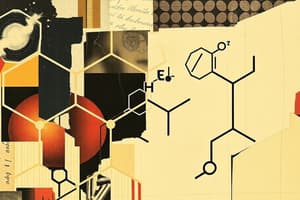Podcast
Questions and Answers
Which type of hydrocarbon contains rings of carbon atoms bonded together by alternating double bonds with hydrogen atoms attached?
Which type of hydrocarbon contains rings of carbon atoms bonded together by alternating double bonds with hydrogen atoms attached?
- Acyclic hydrocarbons
- Aromatic hydrocarbons (correct)
- Aliphatic hydrocarbons
- Cycloalkanes
What is the main characteristic of unsaturated hydrocarbons?
What is the main characteristic of unsaturated hydrocarbons?
- They are not found in nature
- They contain only single bonds
- They contain triple bonds
- They have alternating double bonds (correct)
Which term is used to describe hydrocarbons with all single bonds?
Which term is used to describe hydrocarbons with all single bonds?
- Alkyne
- Alkene
- Alkane (correct)
- Aromatic hydrocarbon
What type of hydrocarbon has no ring structures?
What type of hydrocarbon has no ring structures?
Which class of organic compounds consists only of hydrogen atoms bonded to carbon atoms?
Which class of organic compounds consists only of hydrogen atoms bonded to carbon atoms?
What role do functional groups play in identifying and categorizing organic compounds?
What role do functional groups play in identifying and categorizing organic compounds?
What property of hydrocarbons makes them useful as fuels?
What property of hydrocarbons makes them useful as fuels?
Which functional group is represented by -COOH and is commonly found in carboxylic acids?
Which functional group is represented by -COOH and is commonly found in carboxylic acids?
What is the main difference between structural isomers and stereoisomers?
What is the main difference between structural isomers and stereoisomers?
Why is understanding nomenclature important in organic chemistry?
Why is understanding nomenclature important in organic chemistry?
What role do reaction mechanisms play in organic chemistry?
What role do reaction mechanisms play in organic chemistry?
Which type of organic reaction involves steps like proton transfer, nucleophilic attack, and bond formations?
Which type of organic reaction involves steps like proton transfer, nucleophilic attack, and bond formations?
Flashcards are hidden until you start studying
Study Notes
Introduction
Organic chemistry is the branch of chemistry dealing with the synthesis, structure, properties, and reactions of carbon compounds. These substances often contain hydrogen atoms, although many others such as oxygen, nitrogen, phosphorus, and sulfur may also be present. Hydrocarbons form a major class of organic compounds, while functional groups, isomerism, and nomenclature play significant roles in identifying and categorizing these complex structures. This article will explore these topics in detail, providing insight into the world of organic chemistry.
Hydrocarbons
Definition and Types
Hydrocarbons are organic compounds consisting only of hydrogen atoms bonded to carbon atoms. They are classified based on their molecular composition and structure. Aliphatic hydrocarbons have single bonds between carbon atoms and lack aromaticity, while aromatic hydrocarbons contain rings of carbon atoms bonded together by alternating double bonds with hydrogen atoms attached. Further classifications include acyclic, which contains no ring structures, and cycloalkane, which has one or more ring structures. Unsaturated hydrocarbons contain double or triple bonds, often referred to as alkene or alkyne respectively, while saturated hydrocarbons have all bonds as single bonds called alkane.
Properties and Reactions
Hydrocarbons exhibit various properties due to their carbon-based structure, such as conductivity, reactivity, and thermal energy storage. Their combustibility makes them useful as fuels, and many have potential uses in the production of polymers, pharmaceuticals, and other industrial chemicals. Organic reactions involve processes like electrophilic addition, nucleophilic substitution, and elimination, which can result in new functional groups within molecules.
Functional Groups
Definition and Role
A functional group is a portion of a molecule responsible for specific physical or chemical properties. In organic chemistry, functional groups determine the overall behavior, reactivity, and interactions of organic compounds. Common functional groups include alcohols (-OH), aldehydes (-CHO), carboxylic acids (-COOH), ethers (-OR), and amines (-NH2). The presence of a functional group can significantly affect the molecule's properties, such as its reactivity or solubility.
Isomerism
Types and Importance
Isomerism refers to the coexistence of two or more different compounds that have the same molecular formula but different properties. Organic isomers can be classified into two main types: structural isomers (different molecular structures with the same formula) and stereoisomers (same molecular structure but different spatial arrangement of atoms). Understanding isomerism is crucial in organic chemistry as it helps predict the properties and behavior of molecules based on their structural or stereochemical differences.
Nomenclature
Rules and Importance
Nomenclature is the systematic method for naming organic compounds based on their structure and functional groups. Various rules and guidelines have been established to ensure consistency and clarity in communication. Understanding nomenclature is essential as it allows chemists to accurately describe and discuss different molecules, aiding in the prediction of their behavior and potential reactions.
Reaction Mechanisms
Overview and Role
Reaction mechanisms describe the steps and intermediates involved in a chemical reaction, providing insight into the pathways and conditions leading to specific products. In organic chemistry, understanding reaction mechanisms is crucial for predicting product formation, designing new reactions, and optimizing reaction conditions. Reaction mechanisms can be categorized into various types such as substitution, elimination, and addition reactions, and often involve steps like proton transfer, nucleophilic attack, and bond formations.
In conclusion, organic chemistry is a vast field that encompasses the study of hydrocarbons, functional groups, isomerism, nomenclature, and reaction mechanisms. Understanding these concepts allows chemists to predict the behavior of organic compounds, design new reactions, and optimize processes, ultimately contributing to the advancement of chemistry and its applications in various industries.
Studying That Suits You
Use AI to generate personalized quizzes and flashcards to suit your learning preferences.




